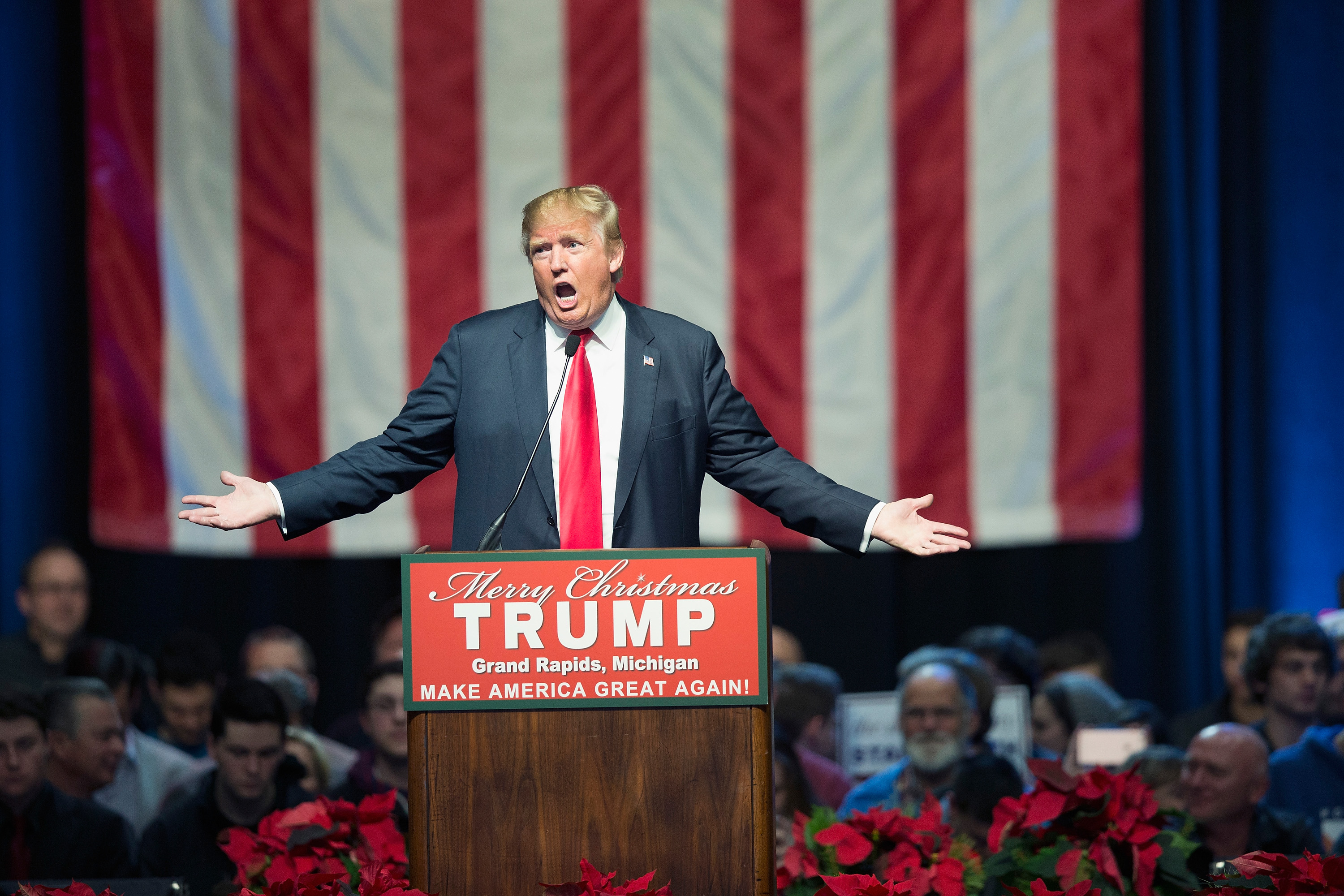Why conservatives must do more than denounce Donald Trump
On National Review and the pitfalls of yelling "stop!"


Last week, the venerable conservative magazine National Review attempted to make good on the mission its founder William F. Buckley once assigned it. "A conservative is someone who stands athwart history, yelling stop," Buckley wrote at the launch of National Review, "at a time when no one is inclined to do so, or to have much patience with those who so urge it." Perhaps at no time did Buckley's words come to life more presciently in the 60 years since than in the aftermath of its "Against Trump" issue.
The magazine assembled nearly two dozen writers who oppose the candidacy of Donald Trump for the Republican presidential nomination to explain their objections on the basis of conservative ideology. Most of the writers are well-known conservative activists, both from inside and outside the ranks of the magazine. Some are friends of mine; symposium contributor Katie Pavlich is both a good friend and a colleague at the Salem Media Group. They put forward coherent and ideologically sound arguments about Trump's lack of conservative temperament and approach to public policy. The magazine's editors offered an institutional denunciation of Trump to match their cover.
They stood athwart the passions of recent history, in other words, and attempted to yell "Stop." And it had about as much impact as one yell might have at an oncoming train.
The Week
Escape your echo chamber. Get the facts behind the news, plus analysis from multiple perspectives.

Sign up for The Week's Free Newsletters
From our morning news briefing to a weekly Good News Newsletter, get the best of The Week delivered directly to your inbox.
From our morning news briefing to a weekly Good News Newsletter, get the best of The Week delivered directly to your inbox.
That's not to say that it didn't produce any amusing moments, such as Fox News' Jeanine Pirro castigating a magazine dedicated to conservative policy for opposing the Republican Party frontrunner before a single vote has been cast. "The National Review needs to get in line with the rest of the Republicans," Pirro tweeted. "How dare they trash the front-runner Donald Trump!" National Review, and other conservative media, do not exist to rubber-stamp a candidate supported by 35 percent of Republican primary voters before the primaries have been held. In fact, some might say that such outlets have more credibility and not less when they buck the popular trends in favor of principle, especially when there is still time for readers and voters to choose the latter over the former.
Other responses turned out to be more substantive. The RNC excluded National Review as a debate partner for the event in Houston next month for its explicit institutional opposition to a specific candidate on the stage. In this, RNC chair Reince Priebus had little choice; earlier last week, they had given NBC the boot from the same debate after CNBC allegedly showed hostility to Republican candidates on stage in the October debate. Its official denunciation of Trump made its role as an impartial moderator difficult to support, even if — as I believe — National Review would have played it above board during the debate. After the CNBC debate, Priebus wants to take no chances.
National Review won't suffer for the decision; publisher Jack Fowler announced that the magazine's website had its best traffic day in the aftermath of the RNC announcement. The magazine also laid down a marker on what may come from a Trump victory in the primaries, setting up several possible "I told you so" lines of argument. But their efforts are unlikely to slow the oncoming train down, let alone stop it.
In three ways, the "Against Trump" issue misses the underlying passions in the electorates of both parties. First, it is no longer enough to stand athwart history and yell, "Stop!" The Republican Party and conservatism has done a good job of that since retaking control of the House, and it has been a necessary brake on the excesses of the Barack Obama agenda. But President Obama will retire in a year, and voters want to know what Republicans and conservatives are for.
A free daily email with the biggest news stories of the day – and the best features from TheWeek.com
That is especially true of voters in swing states, as I discovered in my research and travel for my upcoming book Going Red. They do not want a continuation of the ideological battles that have wracked American politics for the last 25 years or more. Voters want more competent governance, which to them means less intrusion in their lives, but also solutions to the issues that matter most to them — a lack of jobs and economic opportunity, failing education systems, and the sense that America's place in the world has slipped. Conservatism offers insight into how we got here and what to do about it, but voters want a sense from their candidates that they share their dissatisfaction, and have the power to do something to resolve it.
Most importantly, though, is the sense that America's institutions have failed them, including political parties and the so-called elites who populate the political system. Institutional endorsements usually mean little anyway — just ask all of the also-rans who got newspaper endorsements before primaries in the past few decades. Institutional denunciations probably mean even less in a normal cycle, but in an anti-establishment environment such as this cycle's, it might wind up being a perverse kind of endorsement. It feeds into the very passions that have made Trump into a polling frontrunner in a Republican field where the extent of political experience provides an inverse correlation to popular standing. It's not a coincidence that the plethora of governors in the race have either withdrawn or all but dropped off the radar screen.
National Review's "Against Trump" offers excellent questions about the ideological bent of Donald Trump. The problem for National Review and conservatism is that few are actually asking those questions or care about the answers. That is the challenge for conservatism: how to remain relevant in an anti-establishment era. Yelling "Stop!" will not be enough to answer it.
Edward Morrissey has been writing about politics since 2003 in his blog, Captain's Quarters, and now writes for HotAir.com. His columns have appeared in the Washington Post, the New York Post, The New York Sun, the Washington Times, and other newspapers. Morrissey has a daily Internet talk show on politics and culture at Hot Air. Since 2004, Morrissey has had a weekend talk radio show in the Minneapolis/St. Paul area and often fills in as a guest on Salem Radio Network's nationally-syndicated shows. He lives in the Twin Cities area of Minnesota with his wife, son and daughter-in-law, and his two granddaughters. Morrissey's new book, GOING RED, will be published by Crown Forum on April 5, 2016.
-
 Zimbabwe’s driving crisis
Zimbabwe’s driving crisisUnder the Radar Southern African nation is experiencing a ‘public health disaster’ with one of the highest road fatality rates in the world
-
 The Mint’s 250th anniversary coins face a whitewashing controversy
The Mint’s 250th anniversary coins face a whitewashing controversyThe Explainer The designs omitted several notable moments for civil rights and women’s rights
-
 ‘If regulators nix the rail merger, supply chain inefficiency will persist’
‘If regulators nix the rail merger, supply chain inefficiency will persist’Instant Opinion Opinion, comment and editorials of the day
-
 Bari Weiss’ ‘60 Minutes’ scandal is about more than one report
Bari Weiss’ ‘60 Minutes’ scandal is about more than one reportIN THE SPOTLIGHT By blocking an approved segment on a controversial prison holding US deportees in El Salvador, the editor-in-chief of CBS News has become the main story
-
 Has Zohran Mamdani shown the Democrats how to win again?
Has Zohran Mamdani shown the Democrats how to win again?Today’s Big Question New York City mayoral election touted as victory for left-wing populists but moderate centrist wins elsewhere present more complex path for Democratic Party
-
 Millions turn out for anti-Trump ‘No Kings’ rallies
Millions turn out for anti-Trump ‘No Kings’ ralliesSpeed Read An estimated 7 million people participated, 2 million more than at the first ‘No Kings’ protest in June
-
 Ghislaine Maxwell: angling for a Trump pardon
Ghislaine Maxwell: angling for a Trump pardonTalking Point Convicted sex trafficker's testimony could shed new light on president's links to Jeffrey Epstein
-
 The last words and final moments of 40 presidents
The last words and final moments of 40 presidentsThe Explainer Some are eloquent quotes worthy of the holders of the highest office in the nation, and others... aren't
-
 The JFK files: the truth at last?
The JFK files: the truth at last?In The Spotlight More than 64,000 previously classified documents relating the 1963 assassination of John F. Kennedy have been released by the Trump administration
-
 'Seriously, not literally': how should the world take Donald Trump?
'Seriously, not literally': how should the world take Donald Trump?Today's big question White House rhetoric and reality look likely to become increasingly blurred
-
 Will Trump's 'madman' strategy pay off?
Will Trump's 'madman' strategy pay off?Today's Big Question Incoming US president likes to seem unpredictable but, this time round, world leaders could be wise to his playbook
